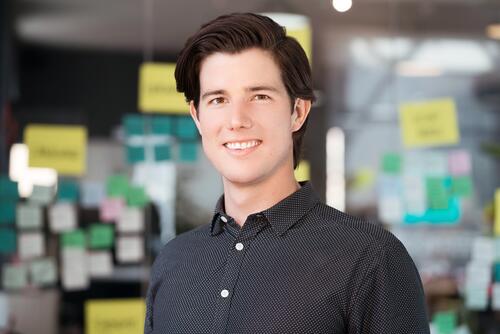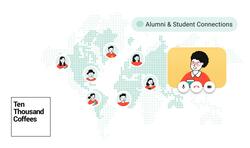
Coffee chats go virtual in pandemic
Engineering hub for Ten Thousand Coffees platform sees double-digit growth and a new group twist

Engineering hub for Ten Thousand Coffees platform sees double-digit growth and a new group twist
By Brian Caldwell Faculty of EngineeringAs the coronavirus pandemic forces people to hunker down and keep their distance in the physical world, the exact opposite is happening in the virtual realm of remote work and online video conferencing.
The need to find new ways of coping and connecting, for instance, has resulted in double-digit growth for Ten Thousand Coffees, a technology company that provides a networking and informal mentoring platform based on the age-old practice of chatting over coffee.
Co-founded by University of Waterloo graduates Dave Wilkin (BSc ’11, biochemistry and business) and Elliott Garcea (BASc ’11, computer engineering), the Toronto-based company brings together alumni from post-secondary institutions and employees within more than 150 organizations around the world, including RBC, AIG, Cigna and McKesson.

Waterloo alumnus Dave Wilkin is a co-founder of Ten Thousand Coffees.
A Waterloo Engineering Hub on the Ten Thousand Coffees platform features well over 3,000 registered users who receive smart matches to fellow alumni and students, either one-to-one or in groups through an Office Hour feature.
By pushing people to try new technologies while they’re in lockdown mode, the pandemic is actually making it faster and easier for them to talk business and get to know each other.
“COVID is allowing alumni and employees to take advantage of their global networks because they can connect online,” said Wilkin, chief executive officer of the company. “They may never have been able to meet somebody in Germany or San Francisco or Sydney before, but now that everybody is buying into digital, they can.
“There are no longer geographic constraints to the alumni you can meet with or the employees you can share with. It has actually been really great for connectivity and networking because you aren’t limited to who is in your little area.”
Paul-Michael Dekker (BASc ’80, systems design engineering) was one of the first Waterloo Engineering alumni to book an Office Hour to host a group of fellow alumni as the COVID-19 crisis was shutting down traditional cocktail events.
Dekker had lived and worked for years in San Diego, where he was an IT director and a consultant in the renewable energy and environmental fields, when he was literally locked out of his home by the COVID border closure while visiting relatives in southern Ontario.
He registered with the Waterloo Engineering Hub on Ten Thousand Coffees to seek out new business opportunities, including clients for a new consultancy called Impossible Dream Builders, and volunteers and team members for an existing environmental impact business, Green Star Standard.
In the process, Dekker also identified a need for a live weekly professional networking group meeting in addition to one-to-one chats within the Waterloo Engineering Hub.
Modelled after networking groups he was involved with in San Diego, the hour-long sessions on Tuesday afternoons include one featured speaker given up to 10 minutes to explain who they are and what they do, and 60-second elevator pitches by up to 30 other participants via Cisco Webex video conferencing.
The basic idea, like the hub itself, is to bring alumni with similar business interests together, allow established professionals to mentor students or recent grads, and foster other mutually beneficial connections.
“Professional, well-structured networking - whether it is face-to-face in the same room or virtually on an online platform - is extremely important to how business actually gets accomplished because humans have to relate to other humans,” Dekker said.
“What previously happened with a handshake now happens with video calls and by working remotely with somebody else, which wasn’t possible to do effectively until the last few years.”
In the case of alumni hubs like the one at Waterloo Engineering, students and recent graduates can learn and get job leads from experienced professionals. The old hands, in turn, hone their leadership skills and identify young talent for their companies and organizations.
“There is a mass buy-in by all generations and at all levels,” said Wilkin. “People are preparing for these conversations just like they’re in-person meetings at an alumni event.
“We’ve always talked about decentralized employees and global teams. Now we’ve suddenly accelerated into that - and I don’t think people will ever go back because they’re realizing it’s actually a better, easier, more democratic way to tap into alumni and employee networks.”

Read more
How Doug Kavanagh’s software engineering degree laid the foundation for a thriving career in patient care

Read more
Upside Robotics secures new funding to accelerate the future of sustainable farming

Read more
Redefining capstone learning by bringing students, faculty and community partners together to tackle real-world challenges
 Registered users of the Waterloo Engineering Hub on the Ten Thousand Coffees platform now number 3,526 students and alumni around the world and across all engineering programs.
Registered users of the Waterloo Engineering Hub on the Ten Thousand Coffees platform now number 3,526 students and alumni around the world and across all engineering programs.
The platform’s artificial intelligence (AI) system has made over 50,000 smart matches for informal mentoring and networking via virtual and in-person coffee or tea conversations.
The most common interests listed by Waterloo Engineering members are: startups, entrepreneurship, AI, emerging technology and mentorship.
Alumni are invited to join for smart matching to fellow and alumni and students by following this VIP link.
Read
Engineering alumni stories
Visit
Waterloo Engineering home
Contact
Waterloo Engineering Development and Alumni Relations
The University of Waterloo acknowledges that much of our work takes place on the traditional territory of the Neutral, Anishinaabeg, and Haudenosaunee peoples. Our main campus is situated on the Haldimand Tract, the land granted to the Six Nations that includes six miles on each side of the Grand River. Our active work toward reconciliation takes place across our campuses through research, learning, teaching, and community building, and is co-ordinated within the Office of Indigenous Relations.